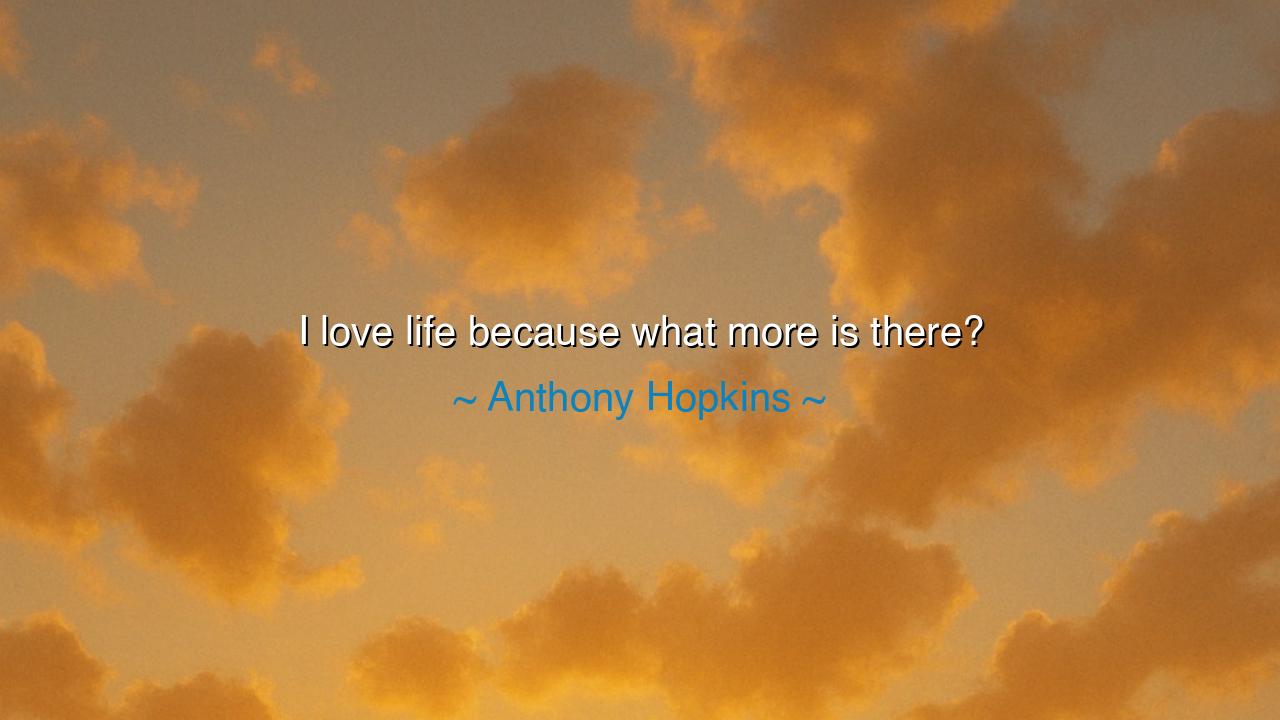
I love life because what more is there?






“I love life because what more is there?” Thus spoke Anthony Hopkins, the master of his craft and the philosopher of his own soul—a man who has walked through the tempests of ambition, fame, addiction, and rebirth. In these words lies a truth as ancient as time itself: that life, in all its chaos and fragility, is the greatest gift given to humankind. To love life is not merely to enjoy its comforts, but to revere its mystery—to bow before the sacred rhythm of existence itself. Hopkins’ words are not spoken with naïve delight, but with the seasoned gratitude of one who has tasted sorrow and found meaning beyond it.
This quote is both a question and an answer—a quiet revelation wrapped in simplicity. When Hopkins says, “what more is there?” he is not dismissing the complexity of the human journey, but distilling it to its divine essence. For beyond the pursuit of wealth, beyond power, art, and even fame, there remains one unchanging truth: to live is to behold the miracle of being. The beating of one’s heart, the breath that flows in and out without command, the sunrise that greets both sinner and saint—these are wonders so constant that we forget their majesty. To love life, as Hopkins declares, is to awaken to the miracle that we are already standing in the midst of eternity, clothed in mortal form.
The origin of this wisdom arises from the actor’s own pilgrimage through despair and redemption. In his younger years, Hopkins was consumed by darkness—lost to addiction, driven by pride, and haunted by self-doubt. Yet through grace and the awakening of his spirit, he found peace not in success, but in surrender. He learned that life, even when stripped of its adornments, remains sacred. His words, “I love life because what more is there,” are not the boast of a man who has conquered the world, but the humble song of one who has discovered that the world itself is enough. He speaks as the ancients once did—those who, standing before the vastness of creation, recognized that to simply be alive is to partake in the divine.
Consider, my listener, the story of Helen Keller, who was both blind and deaf, and yet saw more beauty in the world than many who have perfect sight. Cut off from sound and light, she discovered an inner radiance that no darkness could extinguish. When asked if she felt her life was hard, she answered, “Life is either a daring adventure or nothing at all.” Like Hopkins, she understood that the gift of life itself is the treasure—that existence, not circumstance, is the true miracle. Though deprived of senses, she was never deprived of wonder, for she had found the secret: to love life not for what it gives, but for what it is.
To love life, as Hopkins declares, is also to accept it—to embrace its pain, its imperfection, its mystery. It is easy to love life when it smiles upon us; but the wise love it even when it breaks them, for they know that every sorrow deepens the soul. The ancient Stoics said the same: that we must live in harmony with fate, not because fate is kind, but because it is real. Hopkins’ words carry that same philosophy—rooted not in denial, but in awe. To say “what more is there” is to admit that no possession, no glory, no power can rival the sheer wonder of being conscious, breathing, and aware in the infinite sea of existence.
The lesson in this saying is both simple and profound: do not wait for perfection to love your life. Life will never be perfect, but it will always be sacred. When you wake each morning, you are witness to a miracle so vast that no mind can fully grasp it. To truly live is to open your eyes to beauty even in the mundane, to see meaning in every moment, and to give thanks not only for joy, but for struggle. Love life not as a spectator, but as a participant—immerse yourself in it, engage with it, forgive it, and above all, cherish it.
So, my child of the fleeting days, remember these words: “I love life because what more is there.” When darkness falls, and the heart feels weary, return to this truth. Walk outside and feel the wind on your face, listen to the laughter of others, the hum of the world that never ceases. All of it—grief and joy, silence and song—is life speaking to you. And there is nothing beyond it, for in loving life, you love creation itself. That love is your prayer, your purpose, your peace. For truly, as Hopkins has said, what more is there? Nothing—and everything.






AAdministratorAdministrator
Welcome, honored guests. Please leave a comment, we will respond soon